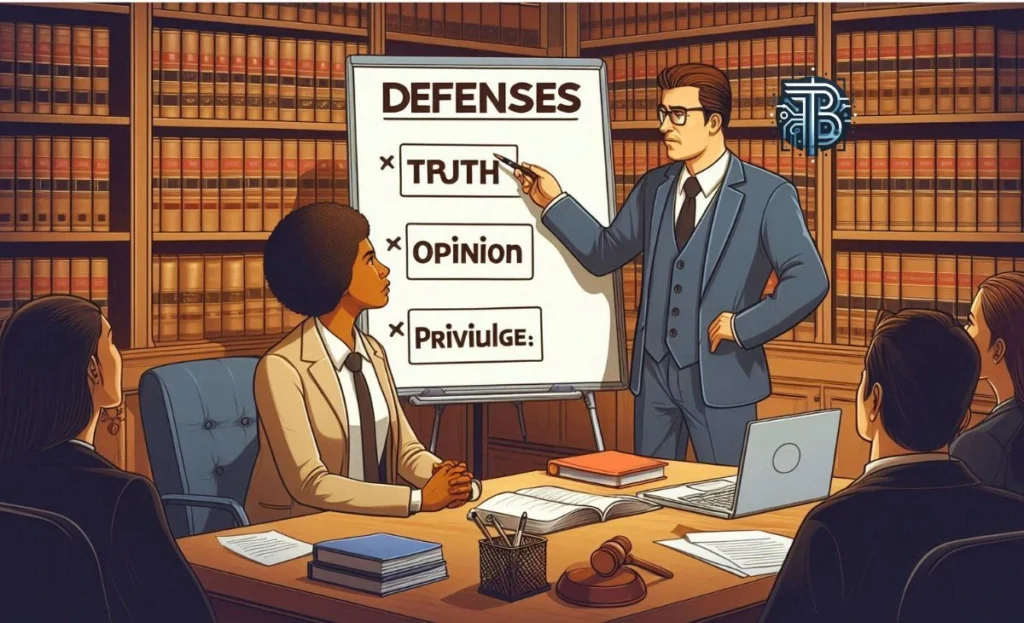
Newsletter Subscribe
Enter your email address below and subscribe to our newsletter

Enter your email address below and subscribe to our newsletter

Have you ever had someone throw dirt on your name? Maybe a so-called friend spread lies about you at school or work. That’s what we call slander. Slander happens when someone makes false spoken statements that hurt your reputation. Slander is when someone says something false about you. It can happen to anyone. It feels more personal because it’s someone talking about you, either in front of you or behind your back.
It’s important to know about slander because it can hurt both the person being talked about and the person saying the bad things. If you find yourself in this situation, you might be asking, “Can I sue this person?” The answer is yes, but it’s not as simple as just going to court and winning. There are specific things you need to prove to make your case, and it can get complicated.
Proving slander is no walk in the park. You can’t just shout, “That’s a lie!” and expect to win. To succeed in a slander lawsuit, you’ve got to meet some legal requirements. Here’s a breakdown of what you need to prove:
The Statement Was False: This is the biggie. If the statement is true, you’re out of luck. Truth is a solid defense against slander claims. So, if someone says you flunked out of school and you actually graduated, you’ve got a case. But if you did flunk, then the person isn’t liable for slander.
Harm Was Done: You’ve got to show that the slanderous statement caused actual harm. This could mean damage to your reputation, emotional distress, or even financial loss. If people believe the lie and treat you differently, that’s harm. For example, if your boss hears a false rumor and decides not to promote you, you’ve got grounds to claim harm.
Negligence or Malice: If you are famous, like a movie star or a politician, you have to show that the person who said bad things about you didn’t care or wanted to hurt you. This means they either knew the statement was false or acted with reckless disregard for the truth. For regular folks, you just need to show that the other person was negligent in what they said.
In short, proving slander means gathering your evidence. Think about texts, recordings, or witnesses who can back up your story. The more solid your proof, the better your chances of winning.
You might be wondering, “Can I really sue for slander?” The answer is a big yes! But before you jump into the legal fray, it’s crucial to think things through. The first step is gathering all your evidence. Make sure you have everything documented. You need good proof, like screenshots from social media, recordings of talks, or people who heard the bad words.
Once you’re ready, it’s time to consult a lawyer. Finding a good attorney who specializes in defamation law is vital. They can help you figure out if you have a strong case. If you and your lawyer decide to move forward, you’ll file a lawsuit against the person who slandered you.
When you file a slander lawsuit, keep in mind that the legal process can take time. You might have to go through a lot of back-and-forth with lawyers and in court. Sometimes, people settle out of court, which means you might get compensated without going to trial. If you win, you could receive damages for the harm done to your reputation and emotional distress. Just remember, the road to justice isn’t always smooth, so buckle up!
If you’re on the receiving end of a slander lawsuit, don’t panic! There are defenses you can use to protect yourself. Here are some of the most common defenses against slander claims:
Truth: This is your golden ticket. If what you said is true, then you’re in the clear. Truth is an absolute defense against slander. If you can prove that your statement is factual, you can’t be held liable.
Opinion: If you’re sharing your personal opinion rather than stating facts, that can also help you defend yourself. For example, saying, “I think he’s a bad manager” is an opinion, not slander.
Privilege: Certain statements made in specific contexts are protected. For example, things said in court or during government discussions are usually protected by a special rule called ‘privilege.’ So if you’re speaking in a court case, you can’t be sued for what you say there.
Public Interest: If you’re discussing matters of public interest, you might also have a defense. For example, if you’re bringing attention to a public figure’s wrongdoing, your statement might be protected.
Having these defenses in your back pocket can make a big difference if you find yourself in a slander lawsuit. Always consult with a lawyer to determine the best strategy for your case.

If you go through the trouble of suing for slander and win, you might be wondering what you can actually recover. Here’s what to expect:
Compensatory Damages: This is the main type of damage you can recover. Compensatory damages are meant to cover the harm done to your reputation. If people think poorly of you because of the slander, you can claim damages for that.
Emotional Distress: If the slander made you feel anxious, sad, or really bad, you can ask for money for emotional pain. It’s important to document how the slander affected your mental well-being.
Lost Income: If the slander led to job loss or missed opportunities, you might recover damages for lost income. For example, if your boss decided not to give you a promotion because of the slander, that’s a financial hit you can claim.
Punitive Damages: In some cases, you can receive punitive damages. These are extra amounts of money given to punish the person who slandered you, especially if they were really mean. It’s meant to send a message that slandering people isn’t okay.
Getting damages is all about showing the impact the slander had on your life. The more evidence you have to support your claims, the better your chances of recovering those damages.
Now, let’s get to the heart of the matter: is it worth it to sue for slander? That’s a tricky question. Here are some things to think about before making your decision:
Legal Costs: Remember that hiring a lawyer and going through a lawsuit can get pricey. You don’t want to end up spending more on legal fees than you might recover in damages.
Time Investment: Legal battles can take forever. You might be in for a long haul, dealing with court dates and paperwork. If you’re not prepared for that, it could be a headache.
Reputation Repair: Sometimes, it’s better to let go and work on fixing your reputation instead of going through a long court process. You could invest your energy into building your image back up instead of fighting over it.
Emotional Toll: Lawsuits can be stressful, and if you’re already feeling hurt from the slander, fighting a legal battle might not be good for your mental health.
At the end of the day, it’s a personal decision. If you think you can prove your case and are ready to fight for your reputation, then go for it! But if it feels too overwhelming or not worth the hassle, sometimes it’s better to let it go and focus on what really matters—your peace of mind.